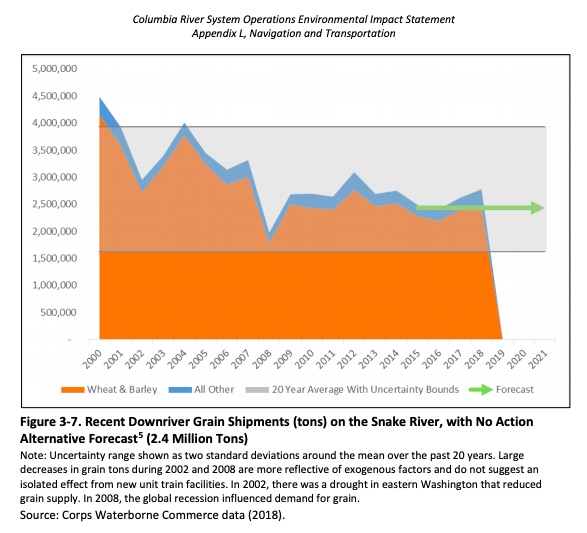forum
library
tutorial
contact

Simpson Works on Budget,
Outreach Aspects of Salmon Plan
by Brad Carlson
Capital Press, June 2, 2021
|
the film forum library tutorial contact |

|
Simpson Works on Budget,
by Brad Carlson
|
Many in agriculture do not support breaching because it would eliminate ports in Lewiston, Idaho,
and Clarkston, Wash., and the opportunity to move wheat and other commodities by barge for export.
 The next step for U.S. Rep. Mike Simpson's concept to save Northwest salmon in part by breaching the four Lower Snake River Dams is to work to get its proposed $33.5 billion Columbia Basin Fund into President Joe Biden's infrastructure package.
The next step for U.S. Rep. Mike Simpson's concept to save Northwest salmon in part by breaching the four Lower Snake River Dams is to work to get its proposed $33.5 billion Columbia Basin Fund into President Joe Biden's infrastructure package.
The money would be available to spend only on a Columbia Basin Initiative plan; otherwise it would revert to the U.S. Treasury, Simpson, R-Idaho, said in an interview. The idea is to keep the money in Northwest hands.
Meanwhile, "we keep talking" to policymakers, he said.
Simpson's concept, which he discussed on the final day of the June 1-2 Big Dam Meeting in McCall, aims to mitigate economic and other losses that breaching would cause. His plan calls for a 35-year moratorium on litigation related to anadromous fish under the Endangered Species Act, National Environmental Policy Act and Clean Water Act.
The Idaho Grain Producers Association hosted the event.
"Politicians are risk-averse," he said. "I have heard, ‘I like it, but I can't support it.' I hear it from a lot of people. They don't want to go on the record."
The plan, which Simpson rolled out in early February, drew mixed official responses from Northwest leaders. And some environmental groups oppose it based on the lawsuit moratorium.
Many in agriculture do not support breaching because it would eliminate ports in Lewiston, Idaho, and Clarkston, Wash., and the opportunity to move wheat and other commodities by barge for export.
"We're all friends," Simpson said in opening remarks. "We have been for a number of years and we will be in the future. I understand the importance of Idaho agriculture."
And, "it's a concept," he said. "A lot of people think I've got a thousand-page piece of legislation ready to go."
Simpson said he started thinking about restoring Northwest salmon five to six years ago. They're recently returning to the uppermost dam in the Lower Snake at rates well below sustainability, he said.
Salmon that spawn lower in the Columbia system have substantially better return rates after surviving the same ocean conditions.
About three years ago, he looked at the issue in terms of increasing the Bonneville Power Administration's financial viability -- challenged by rate dynamics, the need to fight lawsuits and "being a piggy bank for most good ideas everybody ever had," he said, including fish-related mitigation and weather projects.
Simpson didn't contemplate breaching when he started. He supported the concept only after talking with scientists, and many environmental groups that have filed fish-related lawsuits over the past 25 years.
"Their answer was you've got to do what's necessary to save the salmon," he said. "The science is overwhelming that you're going to have to remove these dams if you're going to save the salmon."
Simpson said breaching could be forced, such as by a court, but his plan aims to be Northwest-driven.
"What do you want the Pacific Northwest to be in 20, 30 or 40 years? This is a discussion that has to happen," he said.
Joe Anderson, a wheat grower from Potlatch, Idaho, said railcar availability was tight before the Port of Lewiston was created and likely will be even more so if dams are breached. Several participants in the meeting questioned the economic viability of railcars and trucks as alternatives.
Simpson said he agrees that is a concern, and "I believe we can figure a way to get grain to Portland."
Idaho, Washington, Oregon and Montana in October signed an agreement to work with each other as well as federal partners, tribes and other stakeholders on rebuilding salmon and steelhead stocks.
"I am hopeful these regional conversations will be fruitful," said Idaho Gov. Brad Little, whose multi-stakeholder Salmon Workgroup in January issued recommendations that did not include breaching.
He said he hopes the group looks broadly rather than getting bogged down in a single issue.
learn more on topics covered in the film
see the video
read the script
learn the songs
discussion forum
